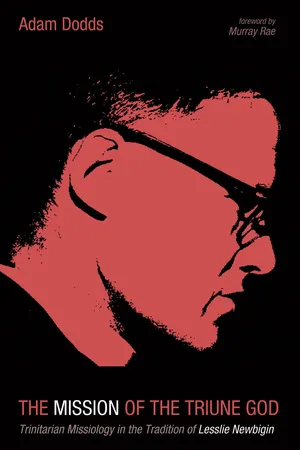![]()
Part One
The Trinitarian Missiology of Lesslie Newbigin
![]()
Chapter 1
The Contours of Newbigin’s Missiology
Introduction
James Edward Lesslie Newbigin was born in England in 1909 and was educated at Cambridge University, where he became a Christian. In 1936, after postgraduate theological study at Cambridge, the Church of Scotland sent Newbigin as a missionary to South India. He participated in the 1947 formation of the Church of South India (thereafter CSI), a church reunion of Presbyterian, Anglican, Methodist and Congregational churches. In that same year he became a Bishop in the CSI, where he remained (with the exception of approximately 6 years) until 1974. Throughout his mission to India, Newbigin saw his task as primarily that of teacher, pastor and evangelist. He carried out his teaching role through the publication of many books concerning ecclesiology, soteriology, missiology, secularism, the theology of religions, and books on the Christian faith that were addressed specifically to his Indian context. In 1974 Newbigin retired from his role as the CSI Bishop of Madras and returned to England. There he embarked upon a new and arguably more difficult mission, his mission to Modernity; it is for this missiological contribution that he is most well-known. In this mission his role as teacher, pastor and evangelist continued unabated. His writings focused on critical engagement with modernity’s plausibility structures that undermine the veracity of the gospel, and restoring to the Western church a proper confidence in the gospel and in its missionary identity and calling.
The purpose of this chapter is to sketch the contours of Newbigin’s theological framework, identifying and explicating its main themes and key doctrines. This will then serve as a context in which to study the place of the doctrine of the Trinity in Newbigin’s thought (chapter 2).
Election in Newbigin’s Missiology
Missional Election
For Newbigin, “The Bible is primarily the story of election,” of “God’s choosing (election) of a people to be His own people, by whom He purposes to save the world.” As with all Newbigin’s theology, he expounded the doctrine of election as found in the biblical narrative. We join that narrative in Jesus’ calling of the twelve disciples.
Firstly, election for Newbigin signifies God’s strategy of choosing some on behalf of all, choosing some for the sake of all. Thus, the biblical doctrine of election is for Newbigin inextricable from conversion and mission. Accordingly, “Conversion will always be wrongly understood unless it is remembered that the Church is the pars pro toto. God converts a man not only that he may be saved, but also that he may be the sign, earnest and instrument of God’s total plan of salvation.”
In the chapter on election in his dogmatics, Emil Brunner begins his discussion with a warning: “The history of the doctrine of Predestination itself teaches us that with the question of the Divine Decrees we have entered the danger-zone, in which faith may suffer severe injury¸ and theological thinking may easily stray into disastrous error.” Brunner had in mind Augustine as interpreted and developed by Calvin and the Calvinist tradition, which taught that God predestined some persons for salvation (the elect) and passed over others (the reprobate). Although identifying with the Reformed tradition, Newbigin does not approach this doctrine within these parameters. Rather, his reading of the doctrine of the election is decisively missional.
Newbigin was aware of the errors in the history of this doctrine and so warned, like Brunner, that election “is so basic to the biblical doctrine of the church and yet capable of such terribly unbiblical distortion.” In line with his Reformed heritage Newbigin accepted that God chooses some and not others, whilst he emphatically rejected other elements of the tradition such as double predestination. In Newbigin’s view, mission was the heart of the doctrine of election, but historically this had been transplanted by spiritual elitism and privilege. He says,
Given Newbigin’s theological context, it was necessary for him to articulate his doctrine of election as responsibility against a background of election as spiritual privilege. Indeed, it might have been the repugnancy of the distortion that awakened him to the doctrine’s missionary dimension; one cannot be sure. Having said this, Newbigin’s doctrine of election was not primarily responsive to and...
